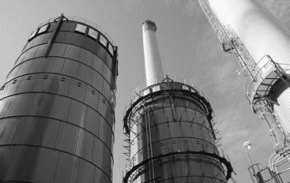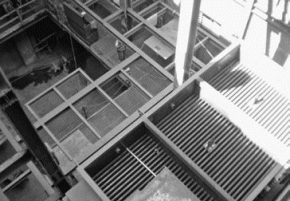Green Horizons
Volume 15, Number 4Fall 2011
Hank Stelzer, MU Forestry Extension
 |
| Woody biomass silos are being constructed alongside these newly-built coal storage silos at the MU power plant. |
The MU Power Plant has awarded its biomass supply contract to Foster Brothers Wood Products, Inc. of Auxvasse, Missouri. Construction on the new boiler and fuel handling systems (for both biomass and coal) is on track. The facility should come online late summer 2012. Once online, the boiler will go through a six- to twelvemonth commissioning period where all the systems are thoroughly tested before the unit is put to work supplying 25 percent of the campusí electrical, heating and cooling needs.
Between now and then, Foster Bros will be putting together their supply chain that, once in full operation, will be bringing 100,000 to 150,000 tons of biomass to the energy plant annually. The reason for the range in tonnage is due to the fact that the optimum operating level of the new biomass boiler is not yet known (every boiler has its unique personality) and the co-firing levels in the existing stoker boilers may vary.
Initially, Foster Bros anticipates that 90 percent of the biomass will consist of non-forest derived residues (non- FDR) and the remaining 10 percent will be forest-derived residues (FDR). Non-FDR material includes sawmill residues consisting of slabs, edgings, end pieces of wood and low-quality log cores from the centers of trees; residues from woodworking shops, barrel factories, and truss and pallet manufacturing; and clean wood waste from right-of-way maintenance and urban areas. FDR material means tops, branches, crooks and other unused portions of trees resulting from commercial timber harvests and trees removed from the forest in timber stand improvement operations. Trees in this latter category are considered structurally weak or having low vigor and lacking any potential to yield a sawlog or survive for at least the next 10 years. The contract calls for Foster Bros to notify the power plant if FDR biomass exceeds their original estimate of ten percent.
While it is beyond the resources of the power plant to establish a chain of custody for non-FDR biomass (tracking biomass from a forest through the various mills and manufacturing facilities), the contract has set the bar very high when it comes to tracking FDR and ensuring the sustainability of our forest resources.
First, all land from which FDR is sourced, public or private, must be managed according to a written forest management plan prepared by a professional forester as recognized by the Society of American Foresters (SAF).
Second, all FDR must be harvested in accordance with the Missouri Woody Biomass Harvesting Best Management Practices Manual, published by the Missouri Department of Conservation, as may be amended during the contract period.
 |
| The economizer portion of the new biomass boiler (lower right) is nearing completion. Its job is to use recirculate waste heat from the boiler (to be erected in the open space in the top left) and pre-heat incoming water. |
Third, each FDR harvesting team must include at least one logger that, as a minimum, has completed the Missouri Forest Products Associationís Professional Timber Harvester Program or its equivalent from a neighboring state. Fourth, no FDR material will be allowed from any clearing operations unless either so prescribed in the written forest management plan for acceptable silvicultural reasons or deemed prudent as a result of a pest outbreak or natural disaster and approved by a professional forester.
Under no circumstances will the power plant accept any woody material that was cut or produced in the process of converting forest land to agricultural row crops or pasture. Nor will they accept any woody material that was cut or produced in the process of converting forest land to commercial development unless the contractor can document thorough a zoning or building permit that such land use conversion was going to happen anyway.
To ensure these sustainability standards are met, the power plant will contract third-party audits conducted by an SAF-certified forester. These auditing procedures are in the process of being developed and will be shared in future issues of GH.